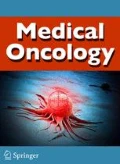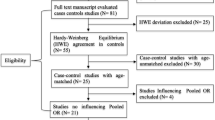Abstract
The association between polymorphisms in the p53 tumor suppressor gene and breast cancer risk has been studied in many human populations with conflicting conclusions. However, similar studies in Arab women are not available, and the status of these polymorphisms in this ethnic population is not known. We investigated the status of four known p53 gene polymorphisms and their possible role in breast cancer risk in Arab women. Genotyping was performed for 288 breast cancer women and 188 controls to determine Pro47Ser, Arg72Pro, Intron 3 Ins16 bp and intron 6 (G > C) polymorphisms. The p53 variant Pro47Ser was detected only in one Kuwaiti breast cancer patient and was not detected in any of the control subjects. Frequency of Arg/Arg at codon 72 was 26.6% in controls and 28.1% in patients, Arg/Pro frequency was 59.6% in controls and 69.4% in patients, the Pro/Pro genotype was 13.8% in controls and 2.4% in patients. We observed that women with Pro/Pro genotype have decreased risk for developing breast cancer (OR = 0.166, 95% CI = 0.067–0.411, p < 0.001). The intron 3 genotypes were A1/A1 (48.9%), A1/A2 (40.6%) and A2/A2 (10.5%) in controls and A1/A1(42.4%), A1/A2 (52.8%) and A2/A2 (4.8%) in cases. The intron 6 genotypes were 92.4% (GG), 7.6% (GC) and 0% (CC) in controls and 96.5% (GG), 3.5% (GC) and 0% (CC) in cases. No statistically significant differences between patients and controls were observed for intron 3 and intron 6 polymorphisms. Our data show that proline homozygosity at p53 codon 72 is associated with decreased breast cancer risk in Arab women.

Similar content being viewed by others
References
Vousden KH, Lane DP. P53 in health and disease. Nat Rev Mol Cell Biol. 2007;8:275–83.
Vogelstein B, Lane D, Levine AJ. Surfing the p53 network. Nature. 2000;408:307–10.
Petitjean A, Mathe E, Kato S, Ishioka C, Tavtigian SV, et al. Impact of mutant p53 functional properties on TP53 mutation patterns and tumor phenotype: lessons from recent developments in the IARC TP53 database. Hum Mutat. 2007;28:622–9.
Whibley C, Pharoah PD, Hollstein M. p53 polymorphisms: cancer implications. Nat Rev Cancer. 2009;9:95–107.
Felley-Bosco E, Weston A, Cawley HM, Bennett WP, Harris CC. Functional studies of a germ-line polymorphism at codon 47 within the p53 gene. Am J Hum Genet. 1993;53:752–9.
Matlashewski GJ, Tuck S, Pim D, Lamb P, Schneider J, Crawford LV. Primary structure polymorphism at amino acid residue 72 of human p53. Mol Cell Biol. 1987;7:961–3.
Dumont P, Leu JI, Della Pietra AC 3rd, George DL, Murphy M. The codon 72 polymorphic variants of p53 have markedly different apoptotic potential. Nat Genet. 2003;33:357–65.
Siddique M, Sabapathy K. Trp53-dependent DNA-repair is affected by the codon 72 polymorphism. Oncogene. 2006;25:3489–500.
Sansone P, Storci G, Pandolfi S, Montanaro L, Chieco P, Bonafe M. The p53 codon 72 proline allele is endowed with enhanced cell-death inducing potential in cancer cells exposed to hypoxia. Br J Cancer. 2007;96:1302–8.
Själander A, Birgander R, Hallmans G, Cajander S, Lenner P, et al. p53 polymorphisms and haplotypes in breast cancer. Carcinogenesis. 1996;17:1313–6.
Langerød A, Bukholm IR, Bregård A, Lønning PE, Andersen TI, et al. The TP53 codon 72 polymorphism may affect the function of TP53 mutations in breast carcinomas but not in colorectal carcinomas. Cancer Epidemiol Biomarkers Prev. 2002;11:1684–8.
Zhang Z, Wang M, Wu D, Wang M, Tong N, et al. P53 codon 72 polymorphism contributes to breast cancer risk: a meta-analysis based on 39 case-control studies. Breast Cancer Res Treat. 2009 Jul 23. [Epub ahead of print].
Suzuki K, Matsui H, Ohtake N, Nakata S, Takei T, et al. p53 codon 72 polymorphism associated with prostate cancer development and progression in Japanese. J Biomed Sci. 2003;10:430–5.
Granja F, Morari J, Morari EC, Correa LA, Assumpção LV, Ward LS. Proline homozygosity in codon 72 of p53 is a factor of susceptibility for thyroid cancer. Cancer Lett. 2004;210:151–7.
Hadhri-Guiga B, Toumi N, Khabir A, Sellami-Boudawara T, Ghorbel A, et al. Proline homozygosity in codon 72 of TP53 is a factor of susceptibility to nasopharyngeal carcinoma in Tunisia. Cancer Genet Cytogenet. 2007;178:89–93.
Suspitsin EN, Buslov KG, Grigoriev MY, Ishutkina JG, Ulibina JM, et al. Evidence against involvement of p53 polymorphism in breast cancer predisposition. Int J Cancer. 2003;103:431–3.
De Vecchi G, Verderio P, Pizzamiglio S, Manoukian S, Bernard L, et al. The p53 Arg72Pro and Ins16 bp polymorphisms and their haplotypes are not associated with breast cancer risk in BRCA-mutation negative familial cases. Cancer Detect Prev. 2008;32:140–3.
Marsh A, Spurdle AB, Turner BC, Fereday S, Thorne H, et al. The intronic G13964C variant in p53 is not a high-risk mutation in familial breast cancer in Australia. Breast Cancer Res. 2001;3:346–9.
Hrstka R, Beranek M, Klocova K, Nenutil R, Vojtesek B. Intronic polymorphisms in TP53 indicate lymph node metastasis in breast cancer. Oncol Rep. 2009;22:1205–11.
Wang-Gohrke S, Becher H, Kreienberg R, Runnebaum IB, Chang-Claude J. Intron 3 16 bp duplication polymorphism of p53 is associated with an increased risk for breast cancer by the age of 50 years. Pharmacogenetics. 2002;12:269–72.
Buyru N, Altinisik J, Demokan S, Dalay N. p53 genotypes and haplotypes associated with risk of breast cancer. Cancer Detect Prev. 2007;3:207–13.
Costa S, Pinto D, Pereira D, Rodrigues H, Cameselle-Teijeiro J, et al. Importance of TP53 codon 72, intron 3 duplication 16 bp polymorphisms in prediction of susceptibility on breast cancer. BMC Cancer. 2008;8:32.
Franeková M, Zúbor P, Stanclová A, Dussan CA, Bohusová T, et al. Association of p53 polymorphisms with breast cancer: a case-control study in Slovak population. Neoplasma. 2007;54:155–61.
Fiszer-Maliszewska Ł, Kazanowska B, Kuśnierczyk P, Mańczak M, Niepiekło W, et al. Is p53 intronic variant G13964C associated with predisposition to cancer? J Appl Genet. 2003;44:547–52.
Xu Y, Yao L, Ouyang T, Li J, Wang T, et al. p53 Codon 72 polymorphism predicts the pathologic response to neoadjuvant chemotherapy in patients with breast cancer. Clin Cancer Res. 2005;11:7328–33.
Alkhalaf M, Al-Bustan S, Hamoda H, Abdella N. Polymorphism of p53 gene codon 72 in Kuwaiti with coronary artery disease and diabetes. Int J Cardiol. 2007;115:1–6.
Akkiprik M, Sonmez O, Gulluoglu BM, Caglar HB, Kaya H, et al. Analysis of p53 Gene Polymorphisms and Protein Over-expression in Patients with Breast Cancer. Path Oncol Res. 2008. doi:10.1007/s12253-008-9129-6.
Beckman G, Birgander R, Sjalander A, Saha N, Holmberg PA, et al. Is p53 polymorphism maintained by natural selection? Hum Hered. 1994;44:266–70.
Singh V, Rastogi N, Mathur N, Singh K, Singh MP. Association of polymorphism in MDM-2 and p53 genes with breast cancer risk in Indian women. Ann Epidemiol. 2008;18:48–57.
Khadang B, Fattahi MJ, Talei A, Dehaghani AS, Ghaderi A. Polymorphism of TP53 codon 72 showed no association with breast cancer in Iranian women. Cancer Genet Cytogenet. 2007;173:38–42.
Cavallone L, Arcand SL, Maugard C, Ghadirian P, Mes-Masson AM, et al. Haplotype analysis of TP53 polymorphisms, Arg72Pro and Ins16, in BRCA1 and BRCA2 mutation carriers of French Canadian descent. BMC Cancer. 2008;8:96.
Vannini I, Zoli W, Tesei A, Rosetti M, Sansone P, et al. Role of p53 codon 72 arginine allele in cell survival in vitro and in the clinical outcome of patients with advanced breast cancer. Tumour Biol. 2008;29:145–51.
Acknowledgments
We thank Dr. James Craik for his critical reading of the manuscript. This study was supported by Kuwait University Research Administration Grants MB01/07, MB04/07 and GM 01/05.
Author information
Authors and Affiliations
Corresponding author
Rights and permissions
About this article
Cite this article
Alawadi, S., Ghabreau, L., Alsaleh, M. et al. P53 gene polymorphisms and breast cancer risk in Arab women. Med Oncol 28, 709–715 (2011). https://doi.org/10.1007/s12032-010-9505-4
Received:
Accepted:
Published:
Issue Date:
DOI: https://doi.org/10.1007/s12032-010-9505-4



